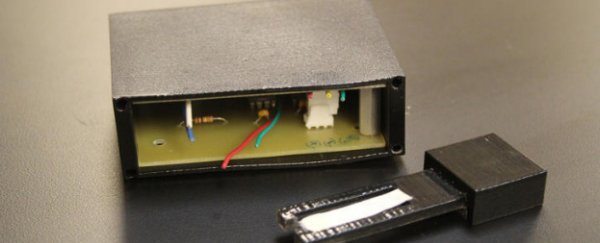Bioengineering students in the US have developed technology that lets people in the developing world use a hacked printer to print out glucose strips for just five cents each. They're also providing them with cheap parts to make their own device to measure their blood sugar levels.
Glucose strips are part of blood glucose level tests diabetics need to perform around five or more times a day to work out how much insulin or food they need to inject to manage their diabetes and avoid complications such as blindness and cardiovascular disease. These strips are then inserted into machines called glucometers, which give them a reading of their levels.
But right now, glucometer machines are hard to access and expensive. And if someone in a developing region can get their hands on one, it will only work with a specific brand of store-bought glucose strips, which can cost around $1 each. For a quarter of the people in Tanzania, where the students started their project, that adds up to around 10 times their average monthly salary.
Now students from Clemson University in South Carolina have developed technology that lets people in developing countries build their own simple glucose testing systems at home for a fraction of the cost, and using easy-to-access parts.
Called GlucoSense, the glucometer is made entirely from off-the-shelf parts that can be bought in electronics stores or easily shipped to remote regions in bulk. And the glucose strips required for each test are even easier to make - they're simply printed with a hacked ink-jet printer.
To create the glucose strips, you just need to replace the dye in regular printers with a special enzyme/dye blend that the students created, and then use a word processor to print this liquid onto filter paper in layers.
Diabetics can then put their blood sample on this paper as they normally would, and insert it into their home-made glucometer, which beams an LED through the strip and measures how much sugar is in the blood sample.
The students have now started their own company, Accessible Diagnostics, to help get the product out to people who need it most by the end of 2015.
"What we've done is come up with an easy manufacturing practice," said co-founder and bioengineering student Delphine Dean in a press release. "We ship the manufacturing materials and then the customer makes them on-site."
The leader of the project, Kayla Gainey, has Type I diabetes herself, and hopes their invention will ensure people around the world will have access to the treatment options she's benefitted from.
"I understand how crucial glucose readings are to treating the disease," said Gainey in the press release. "I've been very fortunate to always have access to monitoring, but for people who haven't, I want to make sure that it's an option."
Watch the video on their device to find out more:

Source: Co.Exist, Clemson University
